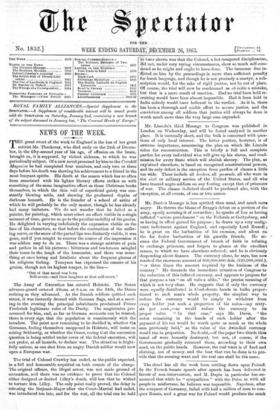Mr. Davis's Message is less spirited than usual, and much
more angry. He throws the blame of Bragg's defeat on a portion of the army, openly accusing it of cowardice ; he speaks of Lee as having inflicted "severe punishment " on the Federals at Gettysburg, and as having in effect gained his purpose ; he draws up a very malig- nant indictment against England, and especially Lord Russell ; he is great on the barbarities of his enemies, and silent on the far fouler barbarities of his guerilla friends. He ac- cuses the Federal Government of breach of faith in refusing to exchange prisoners, and forgets to glance at the excellent reason, to which we have elsewhere referred ; and he is obviously desponding about finance. The currency alone, he says, has now reached the enormous amount of 600,000,000 dole. (120,000,000/.), "or three times the amount required by the business of the country." He demands the immediate attention of Congress to the reduction of this inflated currency, and appears to propose for that .purpose a tax "on all values alike," the precise meaning of which is not very clear. He suggests that if only the curreney were equally distributed in Confederate hands in bulks propor- tioned to each man's whole property, the simplest way to reduce the currency would be simply to withdraw from every holder just such a proportion of his notes—say sixty- six per cent.,—as would reduce the currency to its proper value. "In that case," says Mr. Davis, "the notes remaining in the hands of each holder after the payment of his tax would be worth quite as much as the whole sum previously held," as the value of the dwindled currency would rise in proportion. No doubt,—if the paper two-thirds thus taxed off were honestly destroyed, but not, of course, if the Government gradually returned them, according to their own need, on the public hands. However, the real want is of food and clothing, not of money, and the best that can be done is to pro- vide that the seeming want and the real one shall be the same.






























